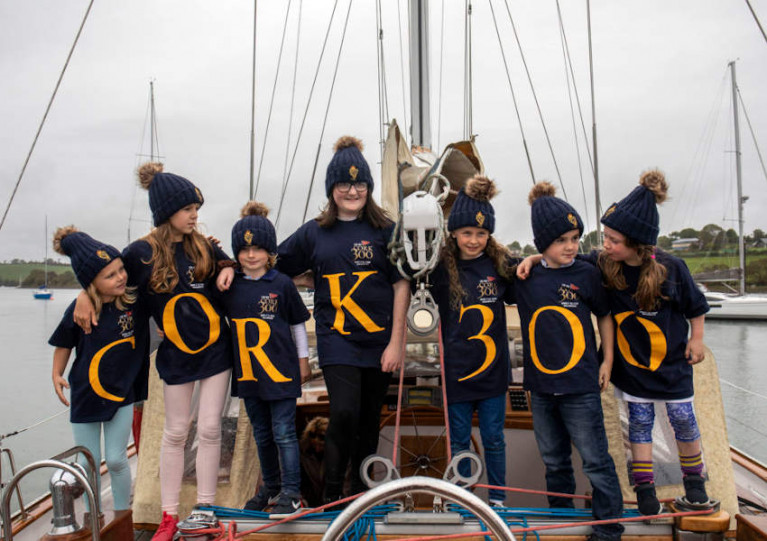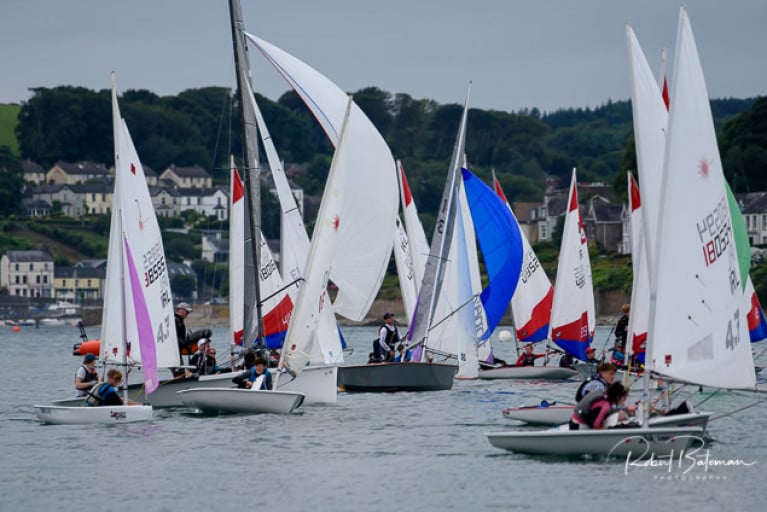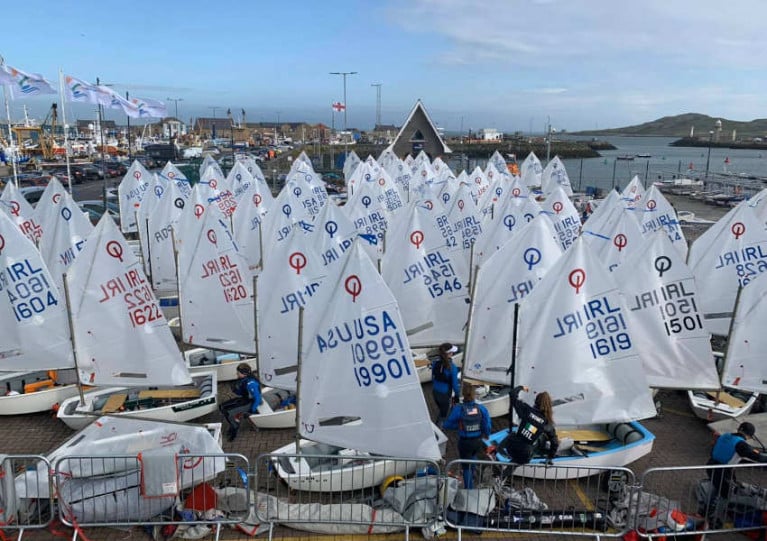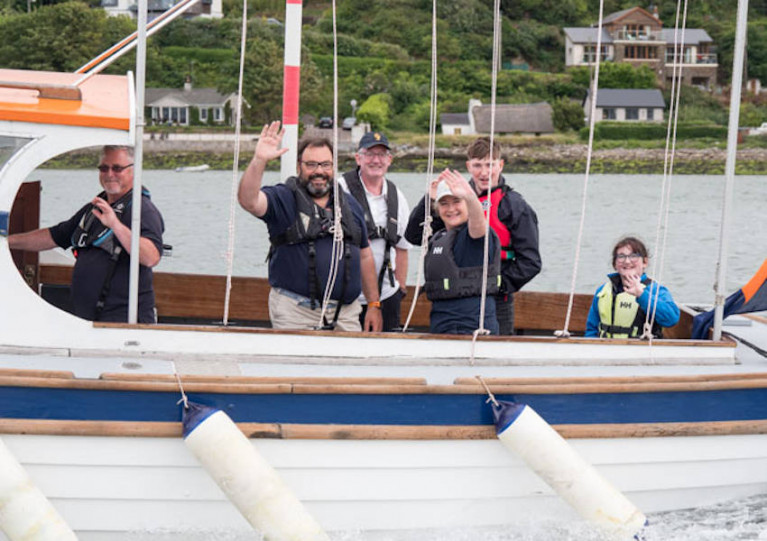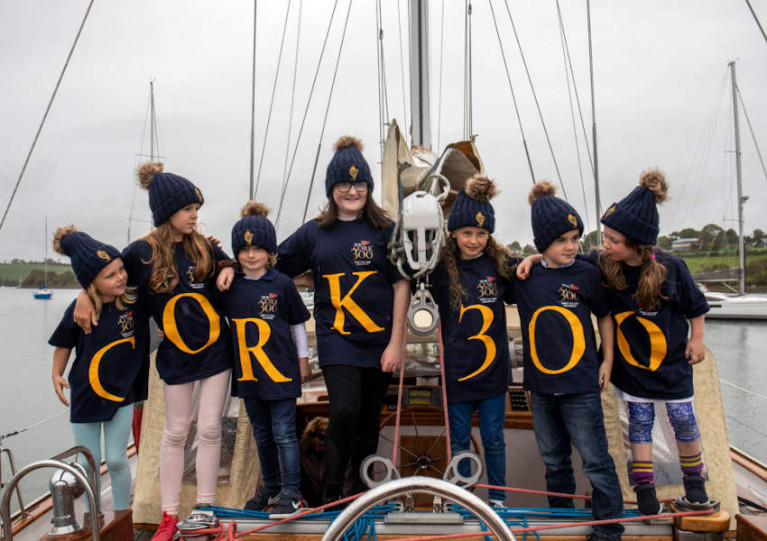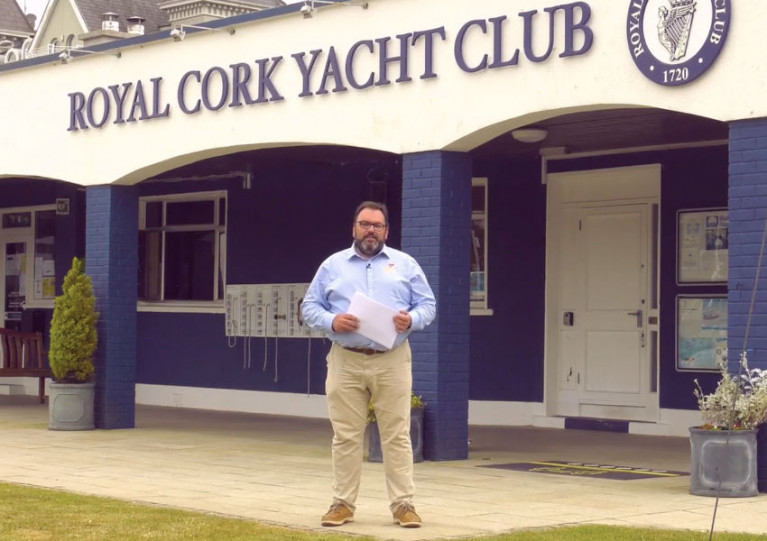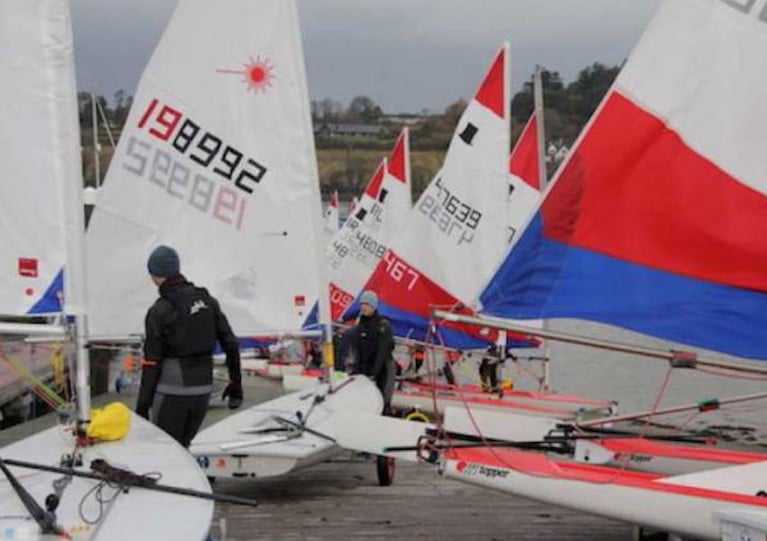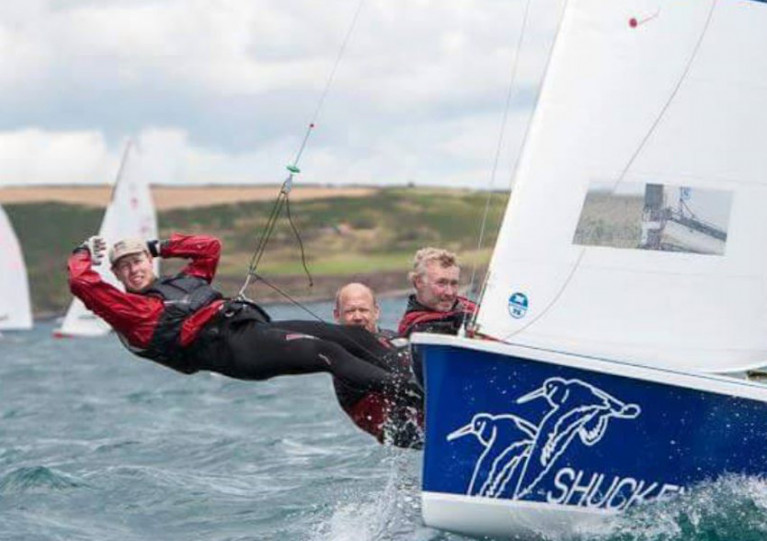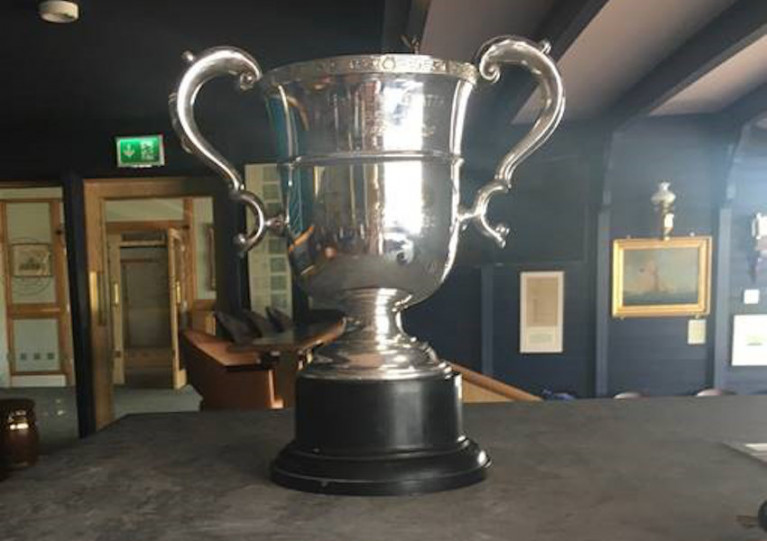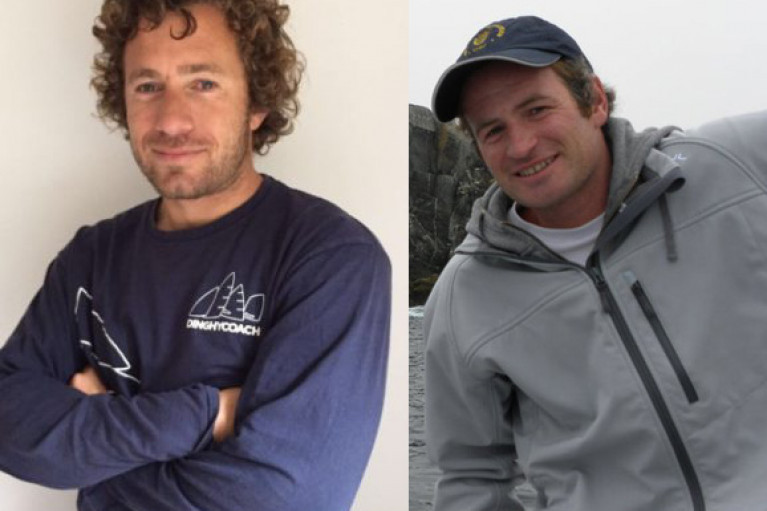Displaying items by tag: RCYC
Royal Cork Yacht Club is planning a very special weekend for the club and its members at the Tricentenary At Home Regatta next month, from 28-30 August.
The weekend’s scheduled kicks off on Friday 28 August with keelboat racing and the 1720 Southern Championships.
Saturday 29 August will see all fleets racing in the morning, followed by the Tricentenary Parade and Admiral’s Salute in Cobh in the afternoon.
After the parade, members are invited to berth in Cobh and attend the opening of an exhibition on the history of the club at the Sirius Arts Centre, and/or attend the Quays Restaurant for an informal gathering and food. For more details see the expression of interest form.
Fleet racing resumes on Sunday morning 30 August, with the afternoon’s family fun activities featuring crab fishing, boules and a bring-your-own picnic ashore, and a parents’ Optimist race on the water.
The National 18 crew of Colin Chapman, Owen O'Keefe and Eddie Rice were yesterday's winners of the AIB sponsored PY 1000 cash Prize at the Royal Cork Yacht Club in Cork Harbour.
With only the lightest harbour breeze available Race Officer John Crotty set the mixed dinghy fleet off on a course that involved all points of sailing from a beat,a run and reaches before heading home for refreshments on the RCYC lawn at Crosshaven.
 Royal Cork Race Officer John Crotty had to contend with some fickle winds for the 2020 PY Race Photo: Bob Bateman
Royal Cork Race Officer John Crotty had to contend with some fickle winds for the 2020 PY Race Photo: Bob Bateman
 The PY1000 2020 dinghy course set in Cork Harbour covered all the angles Photo: Bob Bateman
The PY1000 2020 dinghy course set in Cork Harbour covered all the angles Photo: Bob Bateman
Other cash prizes went to second overall to Tom, Cloe and Patrick Crosbie. Third place went to Andrew Crosbie, all sailing National 18s.
 AIB PY 1000 Winners - Colin Chapman, Owen O'Keefe and Eddie Rice Photo: Bob Bateman
AIB PY 1000 Winners - Colin Chapman, Owen O'Keefe and Eddie Rice Photo: Bob Bateman
Chris Bateman won the Lasers and Shane Collins, the Topper division.
Knox Kohl was the youngest sailor and first female home was Sophie Crosbie.
The youngest crewed boat was sailed by Ethel and Olin Bateman and the oldest combined Crew was Tommy Dwyer and Willy Healy
RCYC AIB PY1000 Photos
See the full slideshow of images from the event below by Bob Bateman
The Royal Cork Yacht Club has confirmed that its hosting of this year’s Optimist Nationals will proceed as planned next month, and the Notice of Race is now available.
The AIB Optimist Irish National Championships 2020 run from 13-16 August as part of the Cork300 celebrations.
And with many top youth sailors unable to travel internationally, their competitive spirit is expected to make this year’s event one of the hottest ever.
Pre-registration is open until next Wednesday 22 July via the IODAI, and sailing instructions will follow shortly.
The first big event of the Royal Cork Yacht Club’s Tricentenary saw members of all ages take part in the Admiral’s Chace on Saturday 4 July.
The Chace began in the vicinity of Cork Beg when, shortly after 3pm, the Admiral fired a signal shot from each quarter of Adrielle, the Cork300 House Flag was broken out and more than 25 craft weighed anchor in pursuit of the Admiral towards Cage.
Whether sailing, motoring or a combination of both, it didn’t matter as this was very much a relaxed affair with the intention of getting everyone out on the water while referencing some of the club’s 300-year-old rules, history and tradition.
The Royal Cork website has more on the story HERE.
The Admiral’s Chace this Saturday 4 July marks the return to organised activities at the Royal Cork Yacht Club as coronavirus restrictions are relaxed this week.
And in celebration of Cork300, will take a more traditional approach to racing, with Royal Cork Admiral Colin Morehead leading the fleet in Adrielle on a harbour course, flying and sounding a number of signals along the way.
The event is open to all keelboats and motor boats. First gun will be at 15:00 in the vicinity of Cage and full instructions will be provided on the day.
After the chase, if time allows, boats will muster in a safe anchorage in the harbour and then return to the club for The Admiral’s Chace Supper, where a burger and a beverage will be served for €5.
Booking for the chase and for the supper are required via the form available HERE.
Royal Cork Admiral Gives Video Update On Reopening Plans
Royal Cork Yacht Club Admiral Colin Morehead has recorded a special video message for club members upon the wider return to sailing in phase two of Ireland’s roadmap to recovery from coronavirus.
Giving thanks to members or their patience and support in adhering to both club and Government guidelines, the admiral welcomed the return of staff to the club this week to get things back up and running.
As previously reported on Afloat.ie, among their roles this week was to celebrate the retention of the club's Blue Flag – one of 10 marinas nationwide to hold the distinction this year.
Junior sailing is under way once again, and keelboat fun events will resume from tomorrow, Sunday 14 June.
Youth sailing will also be to the fore in August with the Optimist Nationals, while the Laser Nationals are also still scheduled to take place that month.
The Tricentenary At Home will now be a three-day regatta, Morehead says, from Friday 28 to Sunday 30 August, including a big flotilla commencing in the Cobh Roads on the afternoon of Saturday 29 August.
It’s also hoped the weekend will see the opening of a special exhibition on the Royal Cork Yacht Club’s history at the Sirius Arts Centre in Cobh — which occupies the Royal Cork’s previous clubhouse.
Subsequent Cork300 events include the All Ireland Sailing Championships, the Sutton Book and the Irish Team Racing Nationals.
And the Autumn League is set to take on a greater significance as the largest keelboat event on the South Coast this year.
The latest updates from the Royal Cork are included in its regular email newsletter. If you do not currently receive this, send your details to [email protected]
Topper Worlds Coming To Cork Harbour In 2021
The 2021 International Topper World Championships come to Cork Harbour next year when they’re hosted by the Royal Cork Yacht Club from 24-30 July 2021.
With over 200 sailors from around the world expected, organisers say it will be a great opportunity for Ireland’s younger sailors to compete on the world stage — as well as a showcase of the Royal Cork and its facilities.
Ireland’s Topper prospects will also have a chance to prove their mettle the following weekend at the other end of the island, as Ballyholme Yacht Club hosts the UK Topper Nationals from 2-6 August 2021.
The news will also come as a boost to Topper sailors disappointed by last month’s cancellation of the National Series due to coronavirus restrictions, though it’s hoped a number of regional friendlies can be arranged for August.
Details on the official launch of next year’s Topper Worlds are coming soon.
National 18 Championship 2020 Cancelled Due To Covid-19
The National 18ft Class Association has very reluctantly concluded that they must cancel the 2020 UK & Irish Championships sponsored by AIB.
The event was due to be held in the Royal Cork Yacht Club this August as part of the Cork300 celebrations.
However, the remaining Government restrictions against coronavirus, in particular those on foreign travel and social distancing, will make it impossible to run a successful event, the organisers said.
Many options were considered, including a deferred 2020 date. But to protect the health of all and the sailing and social integrity of the regatta, the decision has been made to cancel.
Despite the disappointment, plans for a domestic season both in Ireland and the UK are under way with a revised calendar will be issued in the coming weeks, and an announcement on the rescheduling of the Class Championships will follow.
The cancellation does not impact the AIB-sponsored Optimist Nationals or the Laser Nationals, which are also planned for August but later in the month.
Dinghy Sailing Resumes At The Royal Cork
Supervised sailing resumes for single-handed dinghies, as well as multi-handed dinghies crewed by single households, from Monday 8 June at the Royal Cork Yacht Club, with the beginning of Phase 2 of relaxing coronavirus restrictions.
Events being planned for the next three weeks in this new phase include a pop-up cruise in company within the Cork Harbour area, and possible overnight stays at anchor in places such as Oysterhaven and Kinsale.
Phase 3, which is scheduled for Monday 29 June, is expected to see the return of racing for single-handers and same household multi-handers, as well as keelboats, while national and regional events should be allowed to resume in Phase 4 in the second half of July.
Meanwhile, the Royal Cork has put two more trophies on display in the clubhouse for returning sailors to see. One was recently presented, that being the ICC Fastnet Award in recognition of the club’s tricentenary.
But the other comes from the club’s past — in the form of the restored Crosshaven Regatta Roche Perpetual Trophy, recently rediscovered in an attic clearcut. The Royal Cork has more on the story HERE.
Royal Cork Offers Members Chance To Take Part In Weekly Seminars With Renowned Coaches
After a successful introductory webinar on tactics and strategy with Gonzalo ‘Bocha’ Pollitzer and Fernando Gwozdz last month, the Royal Cork Yacht Club is now offering members the opportunity to take part in a further four weekly sessions with the duo from this evening, Monday 1 June.
For €50 per household, members will have access to all four of the webinars which the club says leave you primed for when you get back on the water.
As the topics cross a number of classes, these webinars are aimed at all boats rather than being class-specific:
- Monday 1 June at 7.30pm — Starts: Important concepts and priorities during each minute of the starting sequence
- Sunday 7 June at 7.30pm — Key Moments & Communication: Decision making around the race course and “Calls” onboard
- Sunday 14 June at 7.30pm — Upwind Tactics: a set of different scenarios to think about
- Sunday 21 June at 7.30pm — Reaching/Downwind Tactics: Understanding the key factors for good decision making
For registration and more details, visit the RCYC website HERE.


























